#Women in Mythology
Text

"The legend of Scylla was more extensive. She was the daughter of Phorcys and Crataeis, or of Typhon and Echidna, or of Poseidon. According to others, her mother was Lamia, that queen of Libya who was loved by Zeus and saw her children perish as a result of Hera's jealousy. In her misery she went out of her mind and devoured babies whom she tore from their mothers' arms. Scylla was at first a nymph of rare beauty. Whether it was because she repelled the advances of Glaucus and Glaucus punished her for disdain, or whether, on the contrary, she had given herself to Poseidon and thus excited Amphitrite's jealousy, Scylla was changed by Circe into a monster. While she was bathing in a pool into which Circe had thrown certain magic herbs, six necks suddenly sprang from her shoulders, necks of monstrous length, surmounted by six frightful heads, each supplied with a triple row of teeth.
She lurked in a dark cavern hollowed in the middle of a reef from which emerged only her heads, which snapped up passing dolphins, the dogs of the sea, and those of 'the enormous monsters nurtured by the noisy Amphitrite whom she was able to seize'. When a ship passed within her reach each of her heads would carry off a man from the bench of rowers, and no vessel could boast of escaping Scylla without loss. When Hercules brought Geryon's herd through the straits of Sicily, Scylla seized and devoured one of the oxen. Hercules killed her, but she was resuscitated by her father Phorcys, and mariners passing the straits of Sicily continued to dread the twin perils of Charybdis and Scylla."
#scylla#perioddramaedit#mythology#mythical creatures#myth#greek mythology#greekmythedit#viva bianca#mythologyedit#greekmythologyedit#typhon#circe#women in mythology#userbbelcher#userthing#perioddramasource#ancient history#hercules#mythological creature#glaucos#greek gods#the odyssey#madeline miller#ovid#hesiod#olympus#classical
16 notes
·
View notes
Text
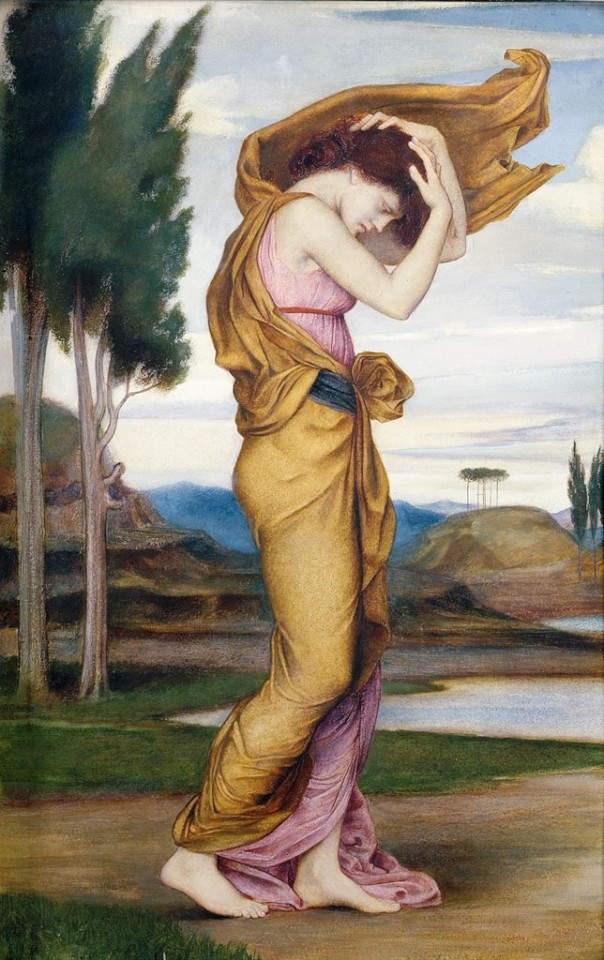
Deianira, Deïanira, or Deianeira also known as Dejanira, is a Calydonian princess in Greek mythology whose name translates as "man-destroyer" or "destroyer of her husband". She was the wife of Heracles and, in late Classical accounts, his unwitting murderer, killing him with the poisoned Shirt of Nessus. She is the main character in Sophocles' play Women of Trachis.
#Evelyn De Morgan#Deianira#Deïanira#Deianeira#Dejanira#greek mythology#women in mythology#paintings#art#arte
19 notes
·
View notes
Text

3 notes
·
View notes
Text
Once there was a poor girl who was, despite her circumstances, very kind. One day as she was cooking an ugly toad jumped into the kitchen. At first, the girl was horrified by the hideous creature and meant to drive it away, but when she saw that it was storming outside, she felt pity for the poor toad. She gave it some food and it ate as though it was starving, gobbling up everything she gave it. If the girl had thought the toad would leave once its hunger was sated, she was wrong. Once fed, the toad took shelter in a corner of the kitchen and hunkered down to rest. The next day, the girl awoke to find the toad still there.
The girl soon grew used to the toad’s presence and began to think of it as something like a friend. She would feed the creature every day, and every day her friend grew bigger. The companions were happy together for some time, until tragedy struck.
The village the girl lived in had long been besieged by a terrible monster.
Keep Reading
#The Faithful Toad#Fairy Tales#Korean Fairy Tales#Women in Mythology#mythos#myths and legends#mythos articles#mythos retellings#folklore#short story
4 notes
·
View notes
Text
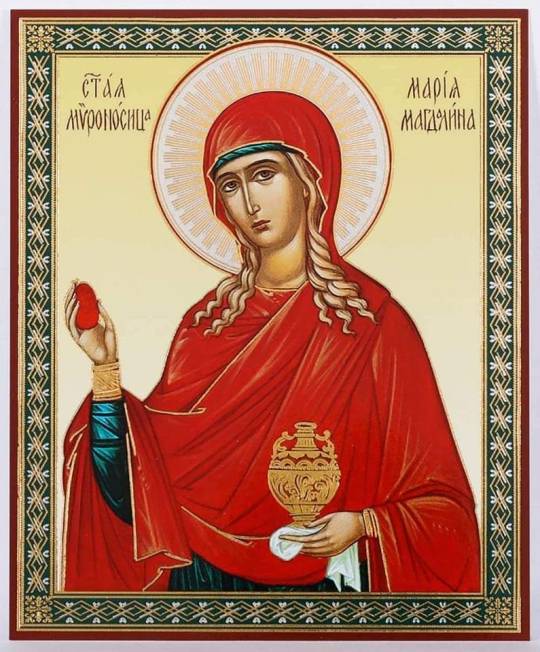
Mary Magdalene
#mary magdalene#divine feminine#divine wild#sacred feminine#historical figures#historical women#women in mythology#iconic women#biblical women#art history#art#women in art#women in history
12 notes
·
View notes
Text
Circe
Formidable Women in Grεεk Mythology


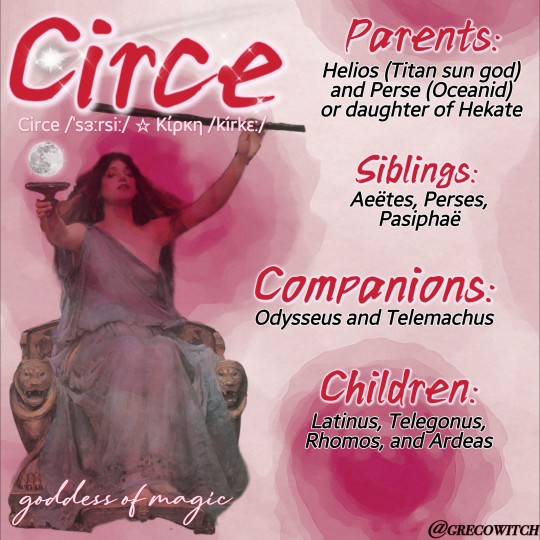
In light of recent events in the DSA (Divided States of America), I decided to create a new post series: #FormidableWomenInGreekMythology. It's not just recent, though. The country itself has stemmed from trauma and oppression, especially of Indigenous, Black, Brown, and Asian people. Overturning Roe v. Wade wasn't "just the beginning" and it's not "just an attack on women". Oppression and dehumanization has been around since its beginnings. The patriarchy is harmful for men, women, and nonbinary folks alike.

First up is Circe (Κίρκη), a witch and the goddess of magick ✨️. Between her inherent knowledge of sorcery and ability to turn enemies into swine, I'd have to say she serves as the perfect symbol for dismantling the patriarchy.

P.S. I worked really hard on this post, but minutes after I posted it to Instagram, it got flagged and taken down from all hashtags. That being said, I'd appreciate it so much if you reblogged this 🥺. Thank you. 💕
#ICantBeSilenced
#Circe#Kirke#Goddess of Magic#Formidable Women In Greek Mythology#Hellenic Polytheism#Hellenic Polytheist#Hellenic Pagan#Women In Mythology#Greek Myths#Greek Mythology
53 notes
·
View notes
Text
My buddy has just opened a Redbubble shop; their work is mainly concerned with the depiction of women in relation to astrology, mythology, or nature. Please check it out, see if you like it.
2 notes
·
View notes
Text
I love you people going into "useless" fields I love you classics majors I love you cultural studies majors I love you comparative literature majors I love you film studies majors I love you near eastern religions majors I love you Greek, Latin, and Hebrew majors I love you ethnic studies I love you people going into any and all small field that isn't considered lucrative in our rotting capitalist society please never stop keeping the sacred flame of knowledge for the sake of knowledge and understanding humanity and not merely for the sake of money alive
#classics#mythology#ancient greek mythology#ancient roman mythology#comparative literature#latin#hebrew#ethnic studies#fuck capitalism#communism#i love my useless degree idc#academia#university#dark academia#Greek#philosophy#liberal arts#humanities#women and gender studies#cultural anthropology
36K notes
·
View notes
Text
in middle school during my Intense Greek Mythology Phase, Artemis was, as you can likely guess, my best girl. Iphigenia was my OTHER best girl. Yes at the same time.
The story of Iphigenia always gets to me when it's not presented as a story of Artemis being capricious and having arbitrary rules about where you can and can't hunt, but instead, making a point about war.
Artemis was, among other things--patron of hunting, wild places, the moon, singlehood--the protector of young girls. That's a really important aspect she was worshipped as: she protected girls and young women. But she was the one who demanded Agamemnon sacrifice his daughter in order for his fleet to be able to sail on for Troy.
There's no contradiction, though, when it's framed as, Artemis making Agamemnon face what he’s doing to the women and children of Troy. His children are not in danger. His son will not be thrown off the ramparts, his daughters will not be taken captive as sex slaves and dragged off to foreign lands, his wife will not have to watch her husband and brothers and children killed. Yet this is what he’s sailing off to Troy to inevitably do. That’s what happens in war. He’s going to go kill other people’s daughters; can he stand to do that to his own? As long as the answer is no—he can kill other people’s children, but not his own—he can’t sail off to war.
Which casts Artemis is a fascinating light, compared to the other gods of the Trojan War. The Trojan War is really a squabble of pride and insults within the Olympian family; Eris decided to cause problems on purpose, leaving Aphrodite smug and Hera and Athena snubbed, and all of this was kinda Zeus’s fault in the first place for not being able to keep it in his pants. And out of this fight mortal men were their game pieces and mortal cities their prizes in restoring their pride. And if hundreds of people die and hundred more lives are ruined, well, that’s what happens when gods fight. Mortals pay the price for gods’ whims and the gods move on in time and the mortals don’t and that’s how it is.
And women especially—Zeus wanted Leda, so he took her. Paris wanted Helen, so he took her. There’s a reason “the Trojan women” even since ancient times were the emblems of victims of a war they never wanted, never asked for, and never had a say in choosing, but was brought down on their heads anyway.
Artemis, in the way of gods, is still acting through human proxies. But it seems notable to me to cast her as the one god to look at the destruction the war is about to wreak on people, and challenge Agamemnon: are you ready to kill innocents? Kill children? Destroy families, leave grieving wives and mothers? Are you? Prove it.
It reminds me of that idea about nuclear codes, the concept of implanting the key in the heart of one of the Oval Office staffers who holds the briefcase, so the president would have to stab a man with a knife to get the key to launch the nukes. “That’s horrible!,” it’s said the response was. “If he had to do that, he might never press the button!” And it’s interesting to see Artemis offering Agamemnon the same choice. You want to burn Troy? Kill your own daughter first. Show me you understand what it means that you’re about to do.
#Electra was my other other best girl#I also stan Clytemnestra#love this murder family of women getting revenge in anguish for their loved ones they will never get back#tagamemnon#Greek Mythology#iphigenia#Trojan War#long post
16K notes
·
View notes
Text
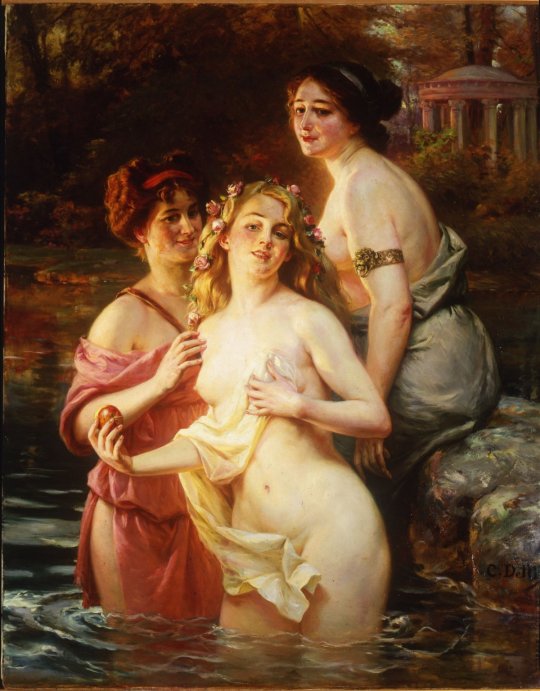
The three Graces, c. 1911
By Cesare Agostino Detti
#art#painting#fine art#classical art#italian art#italian painter#italian artist#beauty#oil painting#grace#women#mythology#greek mythology#mythological art#greek culture#aesthetic#european art#european mythology#20th century art#female figure
2K notes
·
View notes
Text
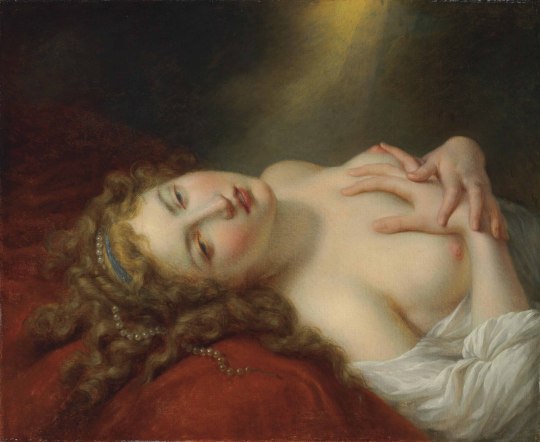
Danae by Jean-Baptiste Regnault
#art#art history#art painting#mythological painting#oil on canvas#painting#19th century art#19th century painting#19th century#old art#vintage art#Jean-Baptiste Regnault#french art#french artist#women in art#nude art
2K notes
·
View notes
Text
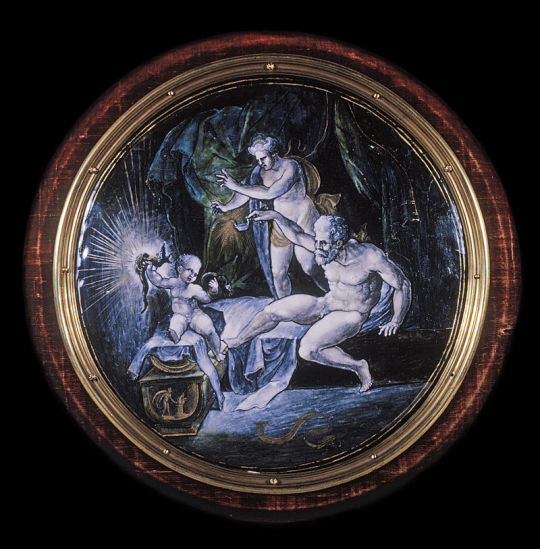
In Greek mythology, Alcmene or Alcmena was the wife of Amphitryon by whom she bore two children, Iphicles and Laonome. She is best known as the mother of Heracles, whose father was the god Zeus. Alcmene was also referred to as Electryone, a patronymic name as a daughter of Electryon.
2 notes
·
View notes
Text
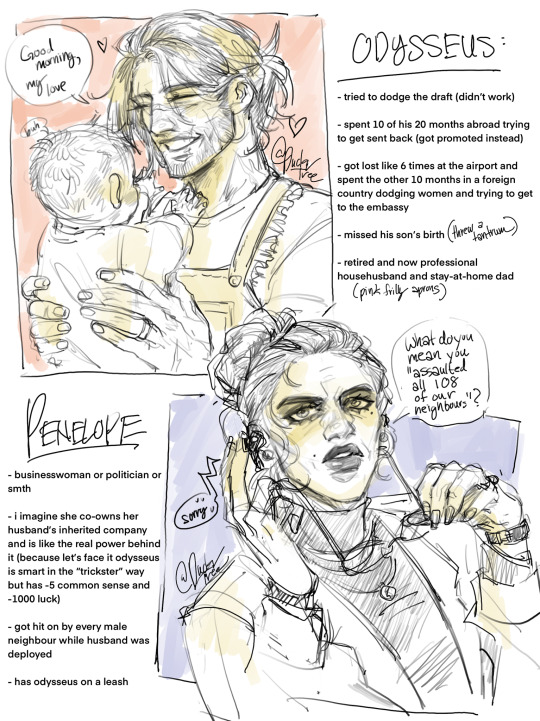
odysseus’s ultimate dream is to hand the work over to his very capable wife who was the only backbone of ithaca for the past 20 years and become a househusband who drinks wine and watches soap operas everyday
modern au where odysseus got drafted lmao
#odysseus#penelope#telemachus#odypen#art#fanart#comic#greek mythology#classics#the illiad#the odyssey#homer#duckytree#odysseus stranded in a foreign country and catching the attention of several women/politicians/princesses/celebrities:#‘pls i just need directions to the embassy’
3K notes
·
View notes
Link
The man I do not love is softly snoring,
Children I did not want are tucked away,
Tomorrow they will wake to bitter mourning –
But I will not be there to sooth or stay.
.
The fur beneath my hands is slowly warming,
The song that once was mine begins to sing,
Tomorrow he will wake in bitter mourning –
But his love was always quite a selfish thing.
Keep Reading
#Mythos#Mythology#Myths and Legends#Folklore#Poetry#Mythos Articles#Mythos Retellings#Seal#Seals#Selkie#Shapeshifting#Shapeshifter#Transformation#Animal Bride#Mythical Creatures#Women in Mythology#Escape#Ocean#Ocean Myths#Sea Myths
56 notes
·
View notes
Text

July 22nd is the Feast Day of Mary Magdalene
❤️🔥🕯️❤️🔥🕯️🔥❤️
Mary Magdalene from "The Divine Wild: A Goddess Oracle", a 40 card oracle deck inspired by iconic women in world history and mythology created by 2MysticMoons & illustrated by Boho & Indie Wild ✨
#art#divine feminine#oracle#oracle card#oracle cards#mary magdalene#tarot#tarot art#tarot inspired#tarot cards#the divine wild#goddess oracle#historical women#historical figures#women in history#iconic women#women in mythology#divine wild#2mysticmoons#muse#muses#goddess#spirituality#inspiration
10 notes
·
View notes
Text
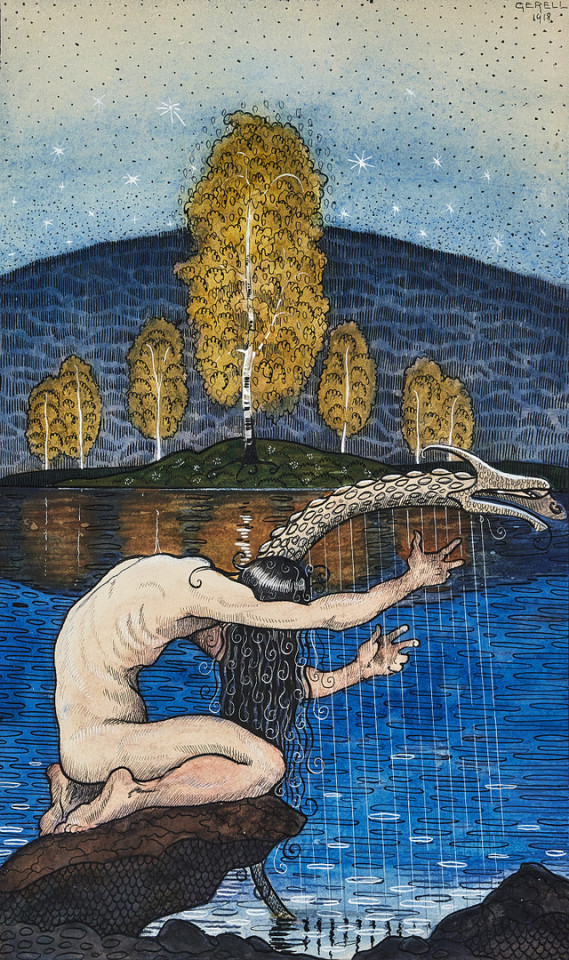
Greta Gerell - Der Hals (1918)
649 notes
·
View notes